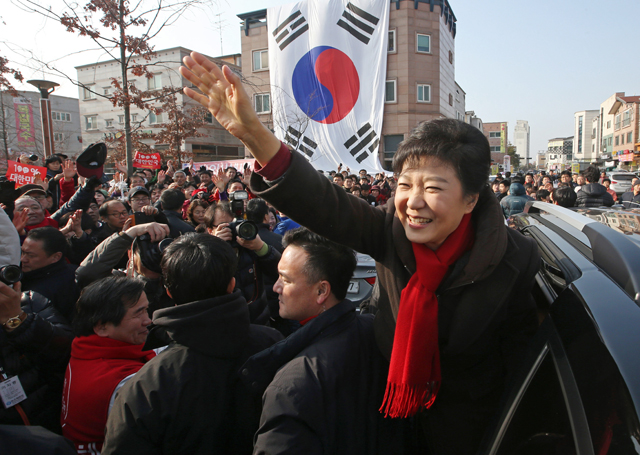Conservative South Korean Victory Will Affirm Strong U.S. Alliance
Bruce Klingner /
Conservative candidate Park Geun-hye won victory to become South Korea’s first woman president.
Park, the daughter of former President Park Chung-hee, beat progressive challenger Moon Jae-in, the chief of staff to former President Roh Moo-hyun. Although both parties shifted toward the center on some foreign policy and economic issues, voters still had a clear choice between competing visions for South Korea’s future.
Park’s victory will be welcomed in Washington for her strong support of the bilateral alliance, a conditional engagement policy toward North Korea, and her embrace of the Korea–U.S. (KORUS) Free Trade Agreement (FTA).
Had Moon Jae-in been elected, bilateral relations with the United States would have become as strained as they had been during Roh’s presidency. Current President Lee Myung-bak established a close personal relationship with Presidents George W. Bush and Barack Obama. In private conversations, South Korean and U.S. policymakers unanimously describe the alliance and relationship as being in the best shape it’s ever been.
Moon vowed he would return to Roh’s unconditional engagement policy toward Pyongyang, which ran counter to U.S. policy and Six Party Talks principles of conditionality, reciprocity, and transparency. Moon, like Roh, believed Seoul should provide extensive economic benefits without any requirement for the regime to institute reform, moderate its aggressive behavior, or uphold its denuclearization commitments.
Moon pledged to uphold Roh’s promises made during the 2007 inter-Korean summit in Seoul to provide billions of dollars worth of construction projects. Moon also proposed an economic union with North Korea that would lead to unification of the two economies. To prevent more North Korean attacks, Moon would return to Roh’s proposal to turn the West Sea into a peace zone and joint economic development zone, thus abandoning South Korean claims of sovereignty upheld since the end of the Korean War.
Park Geun-hye distanced herself to some degree from Lee Myung-bak’s North Korea policy due to the president’s declining popularity. South Korean and U.S. political commentators have interpreted her remarks as predicting a significant softening of Seoul’s strategy toward the North.
However, a closer reading of her policy proposals show greater continuity than change from current South Korean and U.S. policy. Although she has suggested South Korea could resume humanitarian assistance and initial economic development proposals, she has clearly conditioned these on tangible North Korean progress toward denuclearization and economic reforms. She also vowed a firm response to any North Korean provocation or attack. In essence, she’ll give North Korea one “Get out of Jail Free” card, but no more.
Park Geun-hye has demonstrated a strong appreciation for the U.S. alliance and the need for closer military ties to deter or, if necessary, defeat North Korean aggression. She was also a fervent supporter of the KORUS FTA, which Moon had vowed to renegotiate.
The U.S. should not be complacent in dealing with South Korea’s next president however. In 2013, both countries need to renegotiate a new civilian nuclear agreement, which will likely be contentious. Washington has been resistant to Seoul’s repeated requests for permission to reprocess excess fuel from its civilian nuclear reactors, a right already given to Japan. The issue has aroused nationalist concerns in South Korea and could become inflamed if not handled properly.

